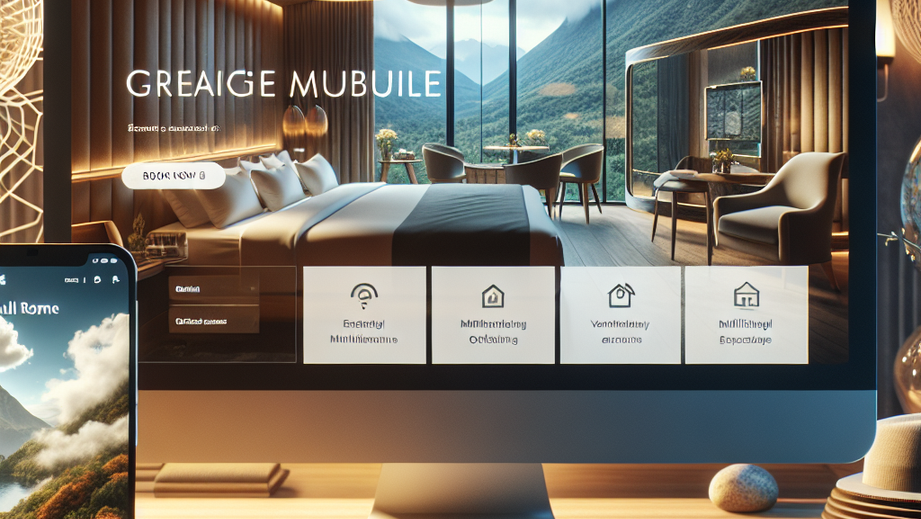In today’s competitive online landscape, it is important for businesses, especially hotels, to establish a strong online presence to succeed. A captivating website is crucial for attracting and converting different target audiences into direct bookings. By using effective strategies, hoteliers can use web design to attract customers and build long-term relationships with them. In this article, we will explore the key factors that make a hotel website stand out.
One important aspect of designing a successful hotel website is understanding the diverse needs of different target audiences. Whether it’s business travelers seeking convenience or vacationers looking for immersive experiences, each group requires a tailored approach to web design and information presentation. By catering to specific preferences and interests, hotels can create a personalized experience that resonates with their desired clientele.
Building a personal database is important for cultivating long-term relationships with customers. Collecting customer contact details, such as email addresses, plays a significant role in achieving this. By capturing this information, hotels can stay connected with past guests, sending personalized offers and updates that keep them engaged and eager to return. This personalized approach fosters loyalty and increases the likelihood of repeat bookings.
To reach a wider audience, hotels must consider a multilingual website as a vital aspect of their web design strategy. A multilingual website not only caters to international travelers but also helps attract customers from different parts of the world. By fostering inclusivity and overcoming language barriers, hotels can tap into new markets and increase their chances of securing bookings from a diverse range of customers.
With mobile devices becoming the primary means of accessing information, responsive design is essential. Statistics show that 70% of searches are now done on mobile devices. To stay competitive, hotels must ensure their website is optimized for mobile, providing a seamless and user-friendly experience for potential guests. A mobile-friendly design is crucial for attracting and retaining visitors and boosting conversion rates.
To encourage visitors to book directly through the hotel website, offering rooms at a preferential rate is a smart strategy. By providing exclusive deals and discounts, hotels can incentivize direct bookings and reduce reliance on online travel agencies. This not only helps hotels regain control over their revenue streams but also allows them to establish a more direct and personal relationship with their guests.
When showcasing rooms, quality visuals and descriptive content are important. Customers want to visualize their stay, so high-resolution photos and videos can make a significant impact in attracting potential guests. Additionally, providing detailed information about amenities, services, and location helps visitors make informed decisions and instills confidence in their choice to book with a particular hotel.
While online travel agencies can be valuable distribution channels, they come with drawbacks such as cannibalizing direct sales and charging higher commissions. By focusing on direct bookings through a well-designed website, hotels can regain control over their revenue streams and reduce dependency on third-party platforms. This empowers hotels to have a more direct relationship with their guests and retain a larger share of their profits.
To drive conversions, it is important to have clearly visible calls-to-action throughout the website. Strategically placed buttons like “BOOK NOW” encourage visitors to take immediate action, resulting in higher conversion rates. By making it easy and convenient for visitors to book, hotels can increase their chances of securing direct bookings and maximizing revenue.
Simplicity is key when presenting information on a hotel website. Essential details such as location, rates, services, and contact information should be easily visible, allowing potential guests to find what they need quickly. Additionally, website load speed is crucial in a world where attention spans are shorter. Ensuring that a hotel website loads quickly and efficiently is vital in retaining potential guests and preventing frustration.
Unlike online travel agencies, hotels have a unique advantage when visitors land on their website. They can showcase their offerings, amenities, and personalized service, allowing them to stand out. By highlighting the advantages of booking directly through the hotel’s website, hotels can make a strong first impression and encourage visitors to choose their property for their next stay.
To encourage direct bookings, creating a sense of urgency and scarcity can be effective. Limited-time offers or exclusive deals can generate a sense of FOMO (fear of missing out), prompting potential guests to secure their reservations promptly. By leveraging the psychology of urgency, hotels can drive immediate action and increase direct bookings.
Offering flexible cancellation conditions provides travelers with peace of mind and encourages bookings. By offering lenient cancellation policies, hotels create a sense of trust and reliability, making guests feel more comfortable committing to a reservation. This commitment to customer satisfaction builds loyalty and encourages repeat bookings.
Simplifying design and navigation enhances the user experience. A clutter-free layout, intuitive navigation menus, and easy-to-find information contribute to an attractive and effective hotel website. By prioritizing simplicity, hotels can create a seamless browsing experience that keeps potential guests engaged and encourages them to explore further.
In conclusion, mastering web design is crucial for hotels aiming to attract and convert customers. By understanding the diverse needs of target audiences, leveraging responsive design, offering exclusive deals, and focusing on user experience, hoteliers can create a high-performing website that drives direct bookings and reduces reliance on online travel agencies. With the right strategies, hotels can establish a strong online presence and cultivate long-term relationships with their guests, ensuring sustained success in the competitive online landscape.











